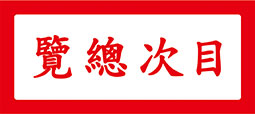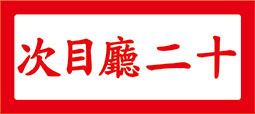In the decade and more after moving to Taiwan in the 38th year of the Republic (1949), many of the founding figures of the Republic of China died of old age one after the other. It has been seventy years since the death of Mr. Wu Ching-heng (吳敬恒) in the 42nd year of the Republic (1953). Mr. Wu was a philosopher, educationist and statesman. Hence at his funeral, President Chiang Kai-shek wrote the characters: “I lost an exemplary teacher in sorrow”. In the 15th year of the Republic (1926), when Chiang Kai-shek was appointed commander-in-chief of the National Revolutionary Army to commence the Northern Expedition, Mr. Wu was assigned to present him with the National Flag. In the following year, the Nationalist Government declared Nanking as the capital, and Mr. Wu proposed an anti-communist platform to purge the Kuomintang of communist members. After Japan declared unconditional surrender, at the National Constituent Assembly in the 35th year of the Republic (1946), Mr. Wu was elected president of the Assembly representatives. After the fall of China to the communists in the 38th year of the Republic (1949), Mr. Wu was appointed member of the Central Committee for the Reform of Kuomintang. Mr. Wu was present at every momentous event of modern China. To commemorate the 70th death anniversary of Mr. Wu, we hereby present the article In Memory of Mr. Wu Ching-heng written by Ambassador Hu Shih in the 42nd year of the Republic (1953).
Curatorial and Editorial Department
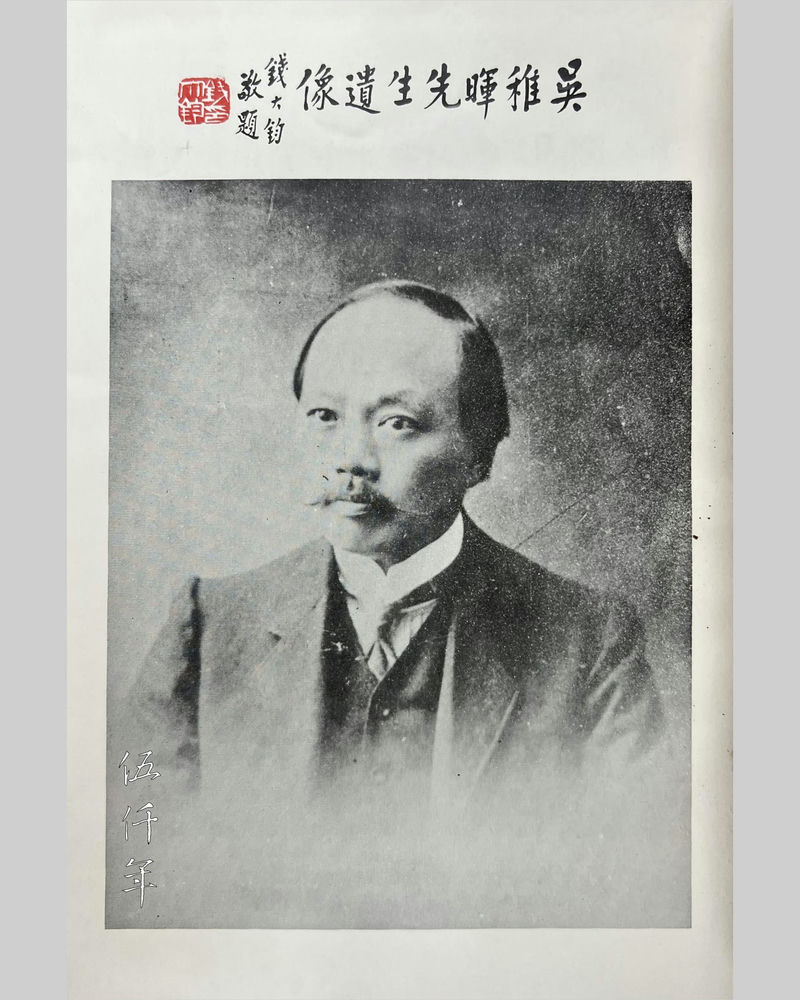
Portrait of Mr. Wu Ching-heng
Mr. Wu Ching-heng passed away in Taipei on 30 October this year (1953) at the age of eighty-nine. Last year on 20 November, I visited him at the National Taiwan University Hospital. At the time, his illness had improved a little. He refused to see me while in bed and insisted that I sit in the adjacent room. He came over after getting dressed and talked as loud as always! When I left, he insisted on escorting me to the door, and waited until I turned the corner before returning to his hospital room. It has been less than a year since we parted, and now this most independent and extraordinary figure of Free China has left us.
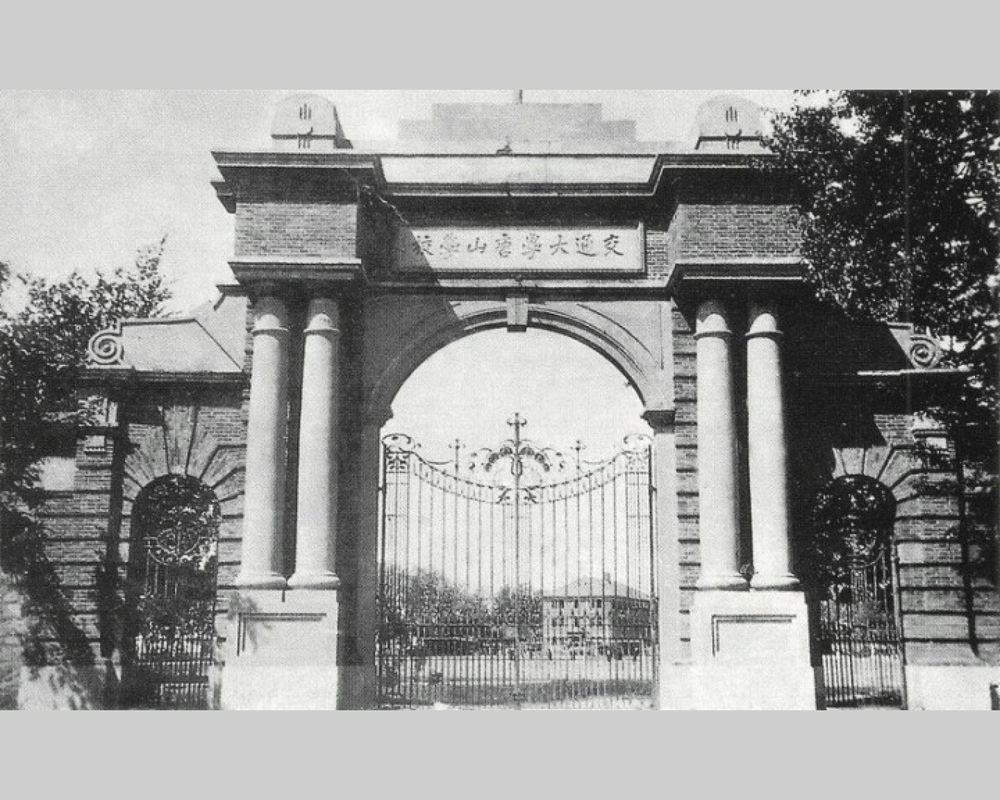
Archway ruin of T’ang-shan Lu K’uang School
I had only very few meetings with Mr. Wu. Once, over thirty years ago, when he was teaching at T’ang-shan Lu K’uang School (唐山路鑛學校), he invited me to give a lecture. That day, I stayed in the teacher’s dormitory and our beds were next to each other. We talked for several hours. That was the longest conversation I had with Mr. Wu alone. Later, during the later stages of the debate between science and metaphysics (in the 12th year of the Republic of China, 1923), I visited Shanghai at one time and Mr. Wu came to my hotel to see me. We discussed The Cosmology and Philosophy of Life According to a New Faith (一個新信仰的宇宙觀及人生觀) he wrote. Suddenly, he became interested in telling me a personal story. He spoke of his youth and the first day he entered the Nan-ching Academy (南菁書院) in Chiang-yin (江陰), where he met the Academy’s headmaster, Mr. Huang I-chou (黃以周 1828-1899) from Ting-hai (定海). He saw eight words written by Mr. Huang on the wall: Shih-shih chiu-shih, mo-tso tiao-jen (Pursue truth, do not be a fence-sitter 實事求是,莫作調人). Mr. Wu said that when he first saw these eight words, he was astonished. The phrase Shih-shih chiu-shih (Pursue truth) was from the Biography of Prince Hsien of Ho-chien in the Book of Han (漢書河間獻王傳), known and remembered by all scholars. However adding mo-tso tiao-jen (do not be a fence-sitter) after Shih-shih chiu-shih (Pursue truth) was a most perceptive remark from Mr. Huang I-chou; it had never been said by the ancients. That was why it surprised Mr. Wu greatly. He said he would never forget these eight words his entire life.
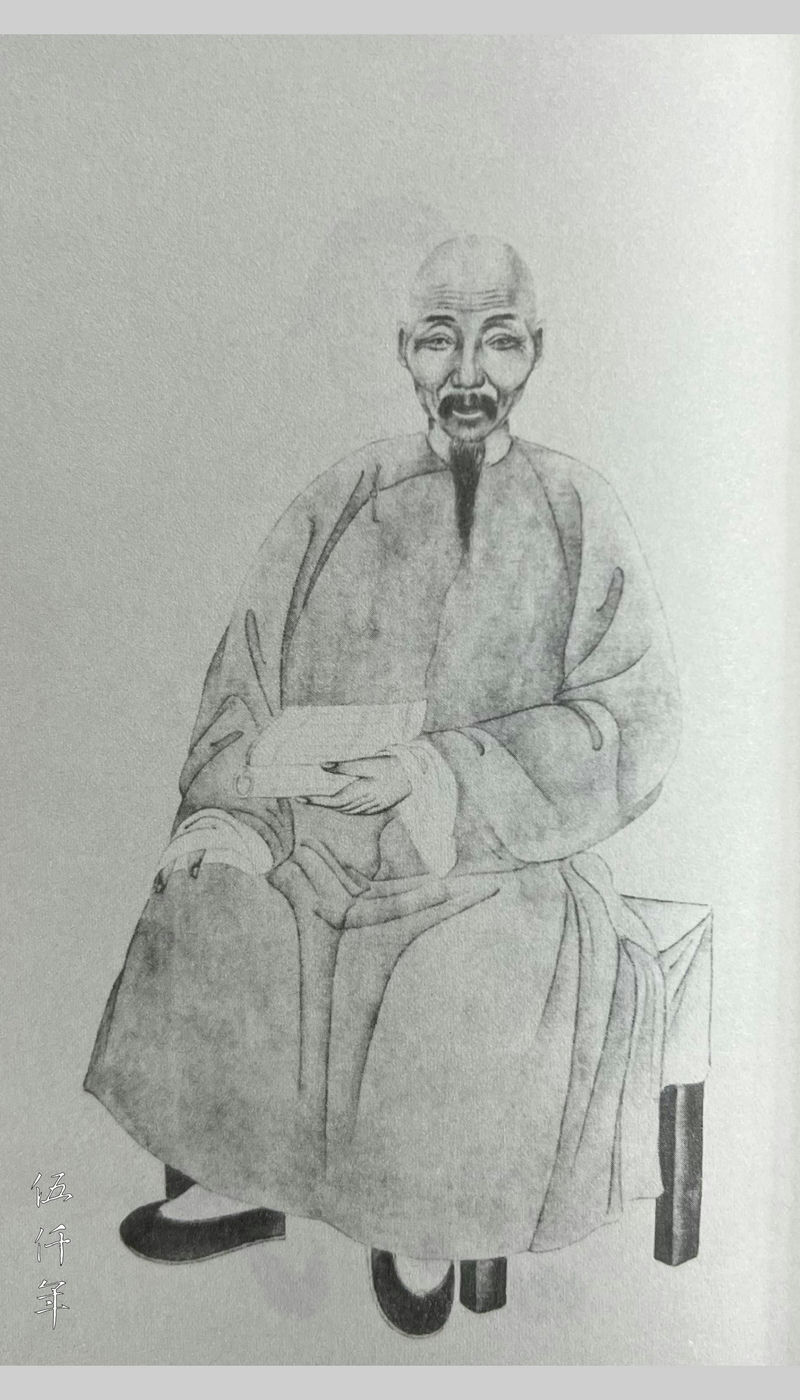
Portrait of Mr. Huang I-chou
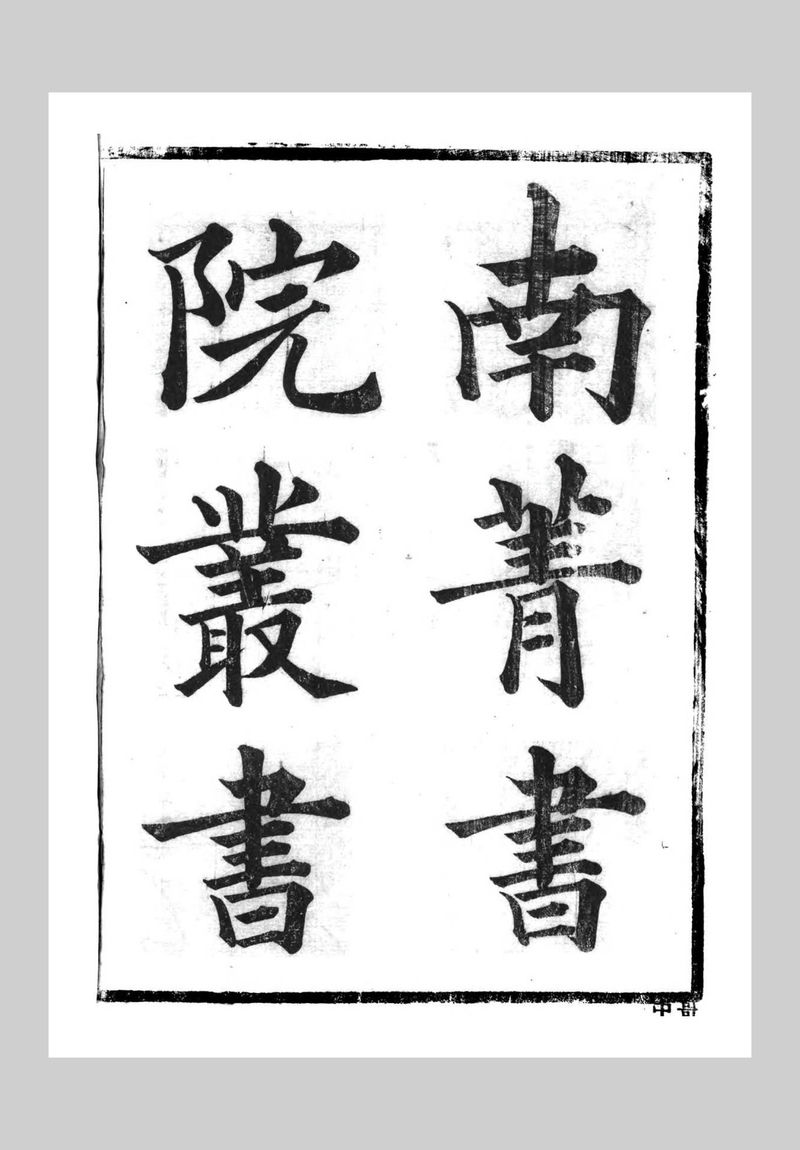
Title page of publication from Nan-ching Academy
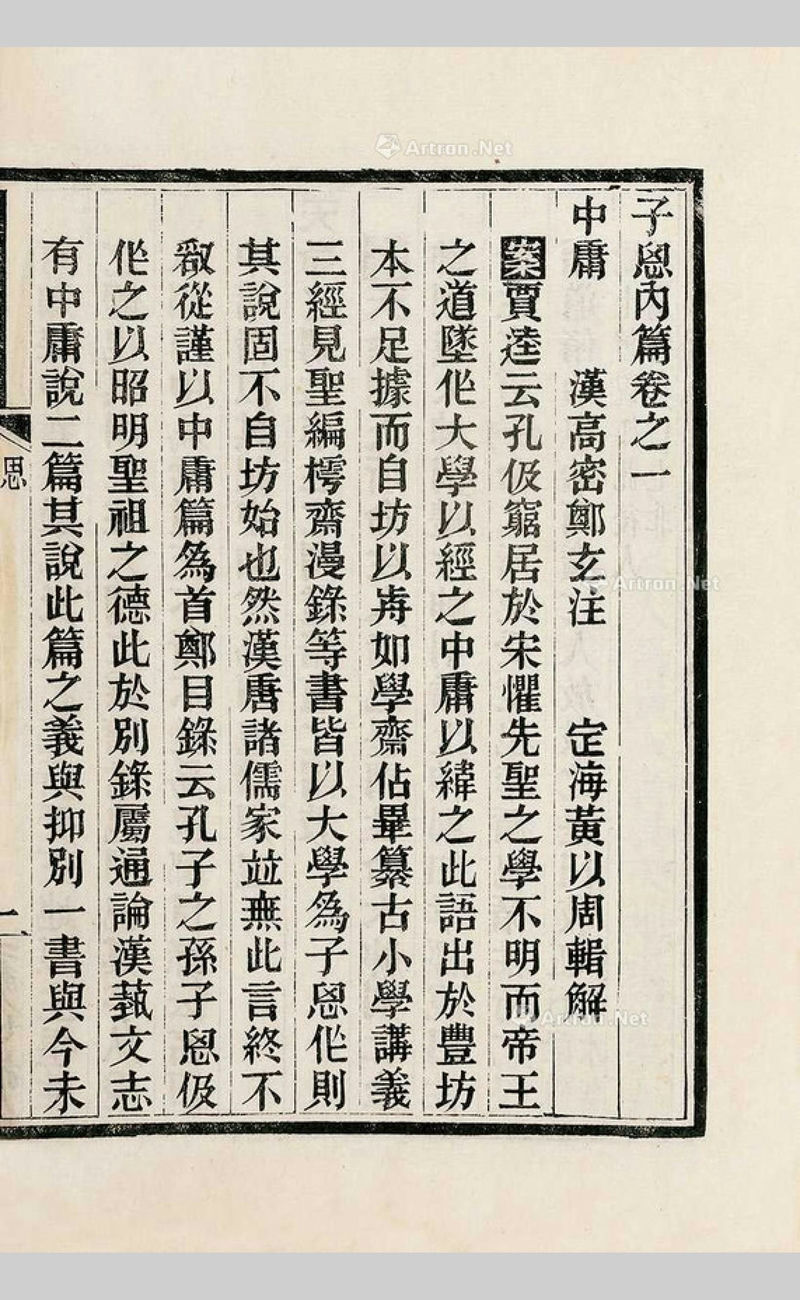
Commentary on the Doctrine of the Mean by Huang I-chou
That day when Mr. Wu told me this story, it seemed like his intention was to convey that his 70,000 word essay The Cosmology and Philosophy of Life According to a New Faith, “excluding God from the equation, banishing the soul of spiritual elements”, with the view of “life” as “a two-handed two-footed creature with a brain performing its drama on the stage of the universe”, in all those thousands of words it boiled down to the spirit encapsulated in the eight words he saw on his first day at Nan-ching Academy, “Pursue truth, do not be a fence-sitter”.
The old gentleman was a top student in Nan-ching Academy (the most famous school nationwide at the time) and a disciple of both Mr. Huang I-chou and Mr. Lin I-shan (林頤山) amongst others. Later, in deep sorrow he told his friend Mr. Chen Sung-ping (陳頌平) that he had “privately thrown the traditional thread-bound books into the lavatory”. He also heartbreakingly warned us publicly: “This stench of ‘national heritage’ ... must be thrown again into the lavatory for thirty years. Now is the time to advocate for a dry and tasteless material civilization. When others use machine guns against us, we also fight back with machine guns. After China is stabilized, it will not be too late to sort out our national heritage!” This earnest and well-intentioned advice was still in line with the spirit of the eight words, “Pursue truth, do not be a fence-sitter”.
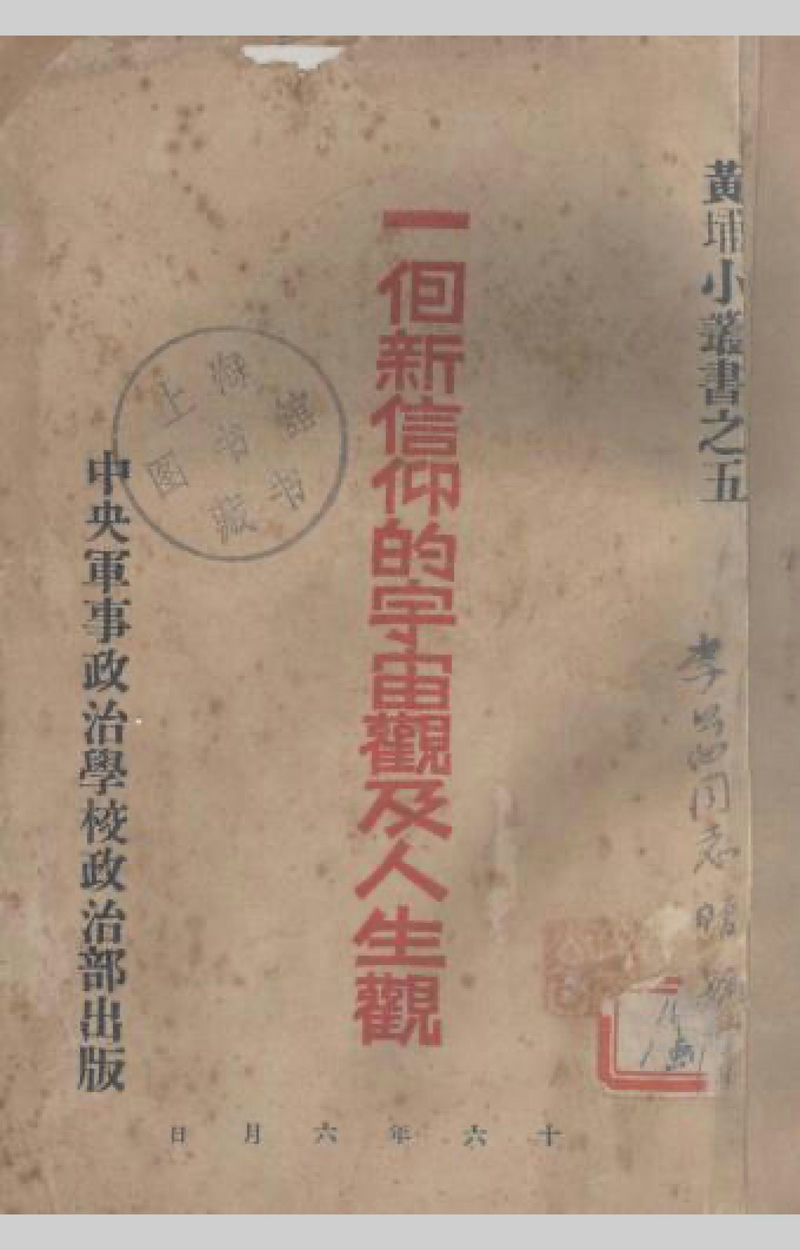
The Cosmology and Philosophy of Life According to a New Faith by Wu Ching-heng
In his essay The Cosmology and Philosophy of Life According to a New Faith, he boldly pointed out the shortcomings of China’s traditional culture. He fearlessly said, “Although the elite also have certain protocols to adhere to, such as house cleaning, polite conversation, etiquette, music, archery, many are empty and superficial regulations. They do not dress properly, nor eat properly, nor walk properly. Their snot and tears run uncontrollably, and their fingernails are filled with dirt. Hence their overall morality is considered shallow”. At the same time he daringly said of the “calculating” western nations, “whether of notions of benevolence, righteousness, morality, filial piety, fraternal respect, loyalty, and trustworthiness, or ways of eating and sleeping, all are better than the three other races (namely, the two groups of Semitic and Arabic peoples, the Indian ethnic group, and the Chinese ethnic group) in terms of practice and enthusiasm... Their overall morality is considered sagacious.
These bold comparisons between Eastern and Western cultures are the kind of judgements in the spirit of “Pursue truth, do not be a fence-sitter” which Mr. Wu, in his whole life, did not forget.
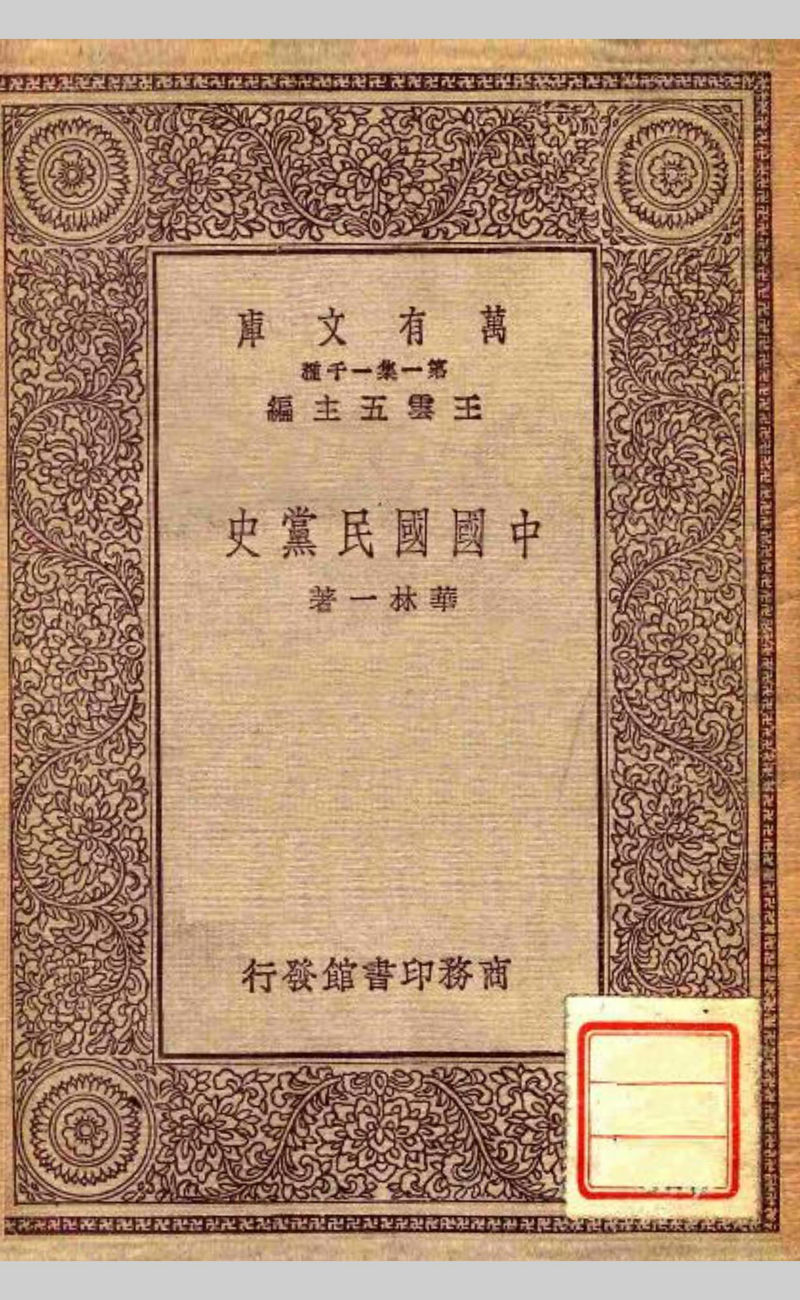
Front cover of the History of Kuomintang of China by Hua Lin-i
During the most successful period of the Northern Expedition by the National Revolutionary Army in the 15th to 16th year of the Republic of China, the hidden agenda of the Communist International to control China through the Chinese Communist Party gradually became apparent. However, both the central party headquarters of the Kuomintang and the National Government were under the control of the conspirators and lacked the ability and determination to take action against the Communist Party. In that critical situation, Mr. Wu Ching-heng, as a member of the Central Supervisory Committee of the Kuomintang, bravely stepped forward and submitted a report titled Exposing the Communist Party’s Plot of Treason to the Central Supervisory Committee convened in Shanghai (2 April in the 16th year of the Republic). Mr. Wu’s report was an important document to the Kuomintang’s “purge of the party” and “anti-communist” efforts; the full text of which was compiled in the History of Kuomintang of China edited by Hua Lin-i (華林一, the first edition published in the 17th year of the Republic, pages 123 - 131). An abstract is in Summary of Party History by Mr. Chang Ch’i-yün (張其昀 Volume 2, pages 629 - 634). Twenty-six years later, on re-reading Mr. Wu’s report of accusation against the Communist Party, one cannot help but admire his foresight. His presentation had two main conclusions:
“1. The step by which the Communist Party intends to eradicate the Kuomintang is to advocate for political supervision by the party group. This is clearly a conspiracy of betrayal plotted together with those Communist Party members who have infiltrated the Kuomintang. This must be stopped internally if the party does not wish to perish.
2. Currently the Government of China is already under the excessive domination of the Russian instigator Borodin. If China is eventually plundered by the Communist Party, it cannot escape direct domination by the Soviet Union, and will become a de facto puppet state under disguised imperialism. Considering the will of Dr. Sun Yat-sen, the Provisional President, “uniting with the peoples in the world that treat us equally”, this is greatly contradictory. Again we must prevent any unequal treatment and expose early all conspirators who are traitors to the country.” (Pages 129-130 in Hua’s book; pages 632-633 in Chang’s book.)
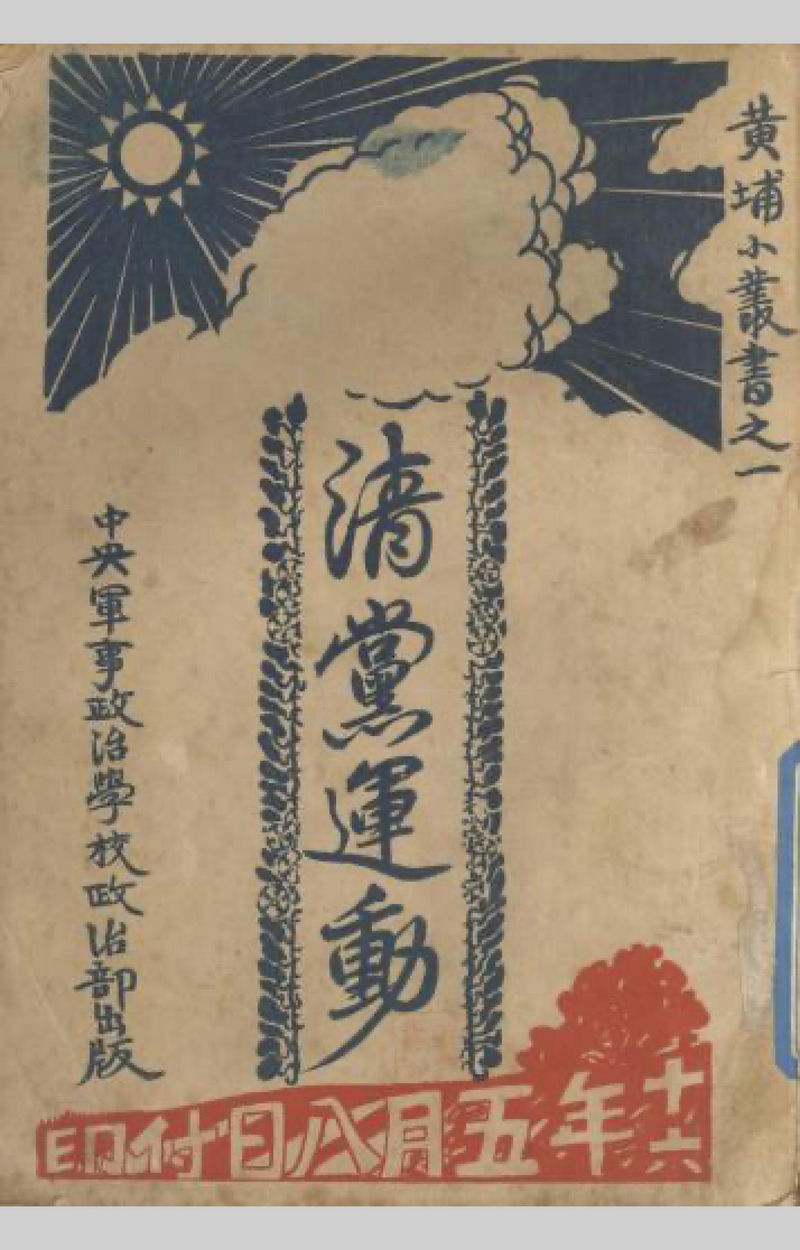
Front cover of the Purge of the Party published by the Central Military Political School in 1927
Ever since the Communist Party gained power in the Russian October Revolution, they planned to incite revolutions and gain power in countries around the world by using the method of “infiltration”. The first experiment was in Hungary, where they established Bela Kun’s communist revolutionary regime, which later failed. The second experiment was in Turkey, where they helped the Kemalist revolution to succeed, but Turkey later turned against Russia and communism. The third experiment is in China, where the Communist Party used individuals to join the Kuomintang in their personal capacity and gained important positions within the Kuomintang’s central party headquarters, the government, and the political departments of the military and amongst representatives of the party. Later, when the Northern Expeditionary Forces reached the cities along the Yangtze River and the National Government moved to Wu-han (武漢), the situation at the time was that the Communist International, under the direction of the Soviet Union, controlled the Kuomintang’s party center and the National Government. It was indeed as Mr. Wu said, “Those who were seasoned and deeply saddened dared not dissent, while those who sought assimilation willingly became puppets. Borodin already controlled China under the National Government. There is no doubt about it.”
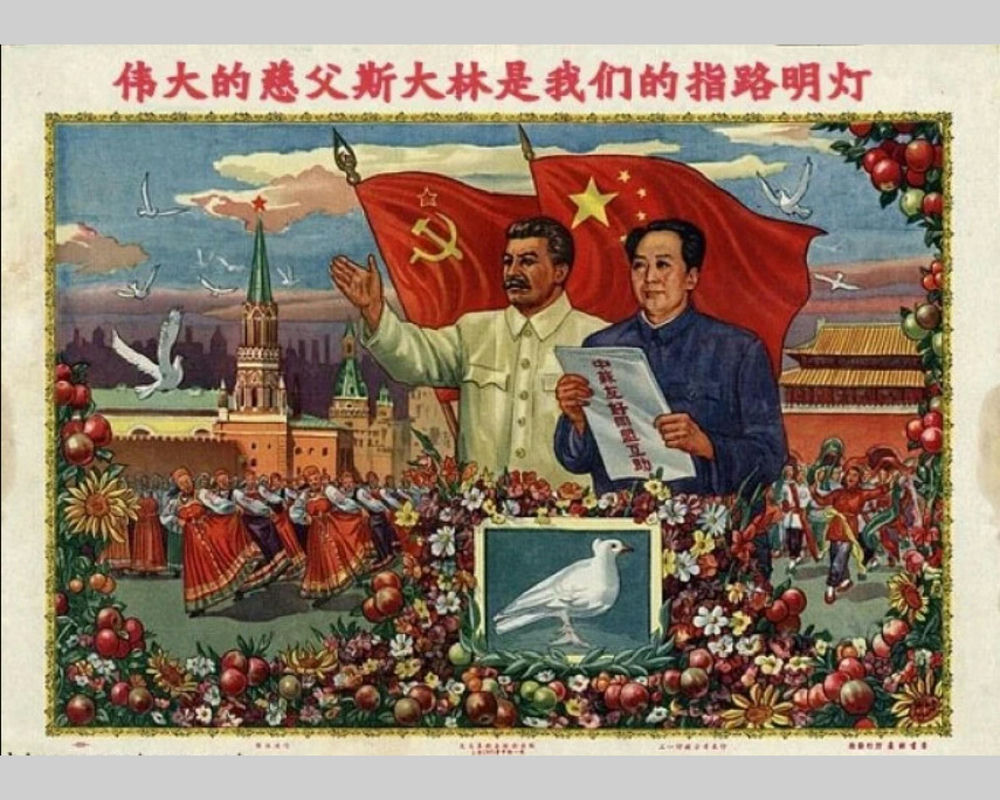
Poster titled Stalin the Great and Kind-Hearted Father is Our Light Post published by the Chinese Communist Party
Stalin had already seized dictatorial power in the Soviet Union, and he used the tool of the “Third International” to fully support the Communist Party’s conspiracy to seize China. Looking back more than 20 years later, we can now clearly see the situation from the directives issued by Stalin in documents, such as Stalin on the Chinese Revolution and Lenin and Stalin on China and other books published by the Chinese Communist Party in recent years. However, at that time, the public could not comprehend such a grand conspiracy. Mr. Wu Ching-heng’s report could only posit a suspicion, saying, “If China is eventually plundered by the Communist Party, it cannot escape direct domination by the Soviet Union, and will become a de facto puppet state under disguised imperialism.” Now that we know the historical fact of the Eastern European countries being conquered, the historical fact of the conquest of Northern Europe, and the historical fact of the entire Chinese mainland being conquered, we should realize even more so that were it not for the “purge of the party” and the “anti-communist” actions taken twenty-six years ago, the Chinese mainland would have been under communist rule for more than twenty years, and perhaps the whole of Asia would have been under communist rule for many years as well.
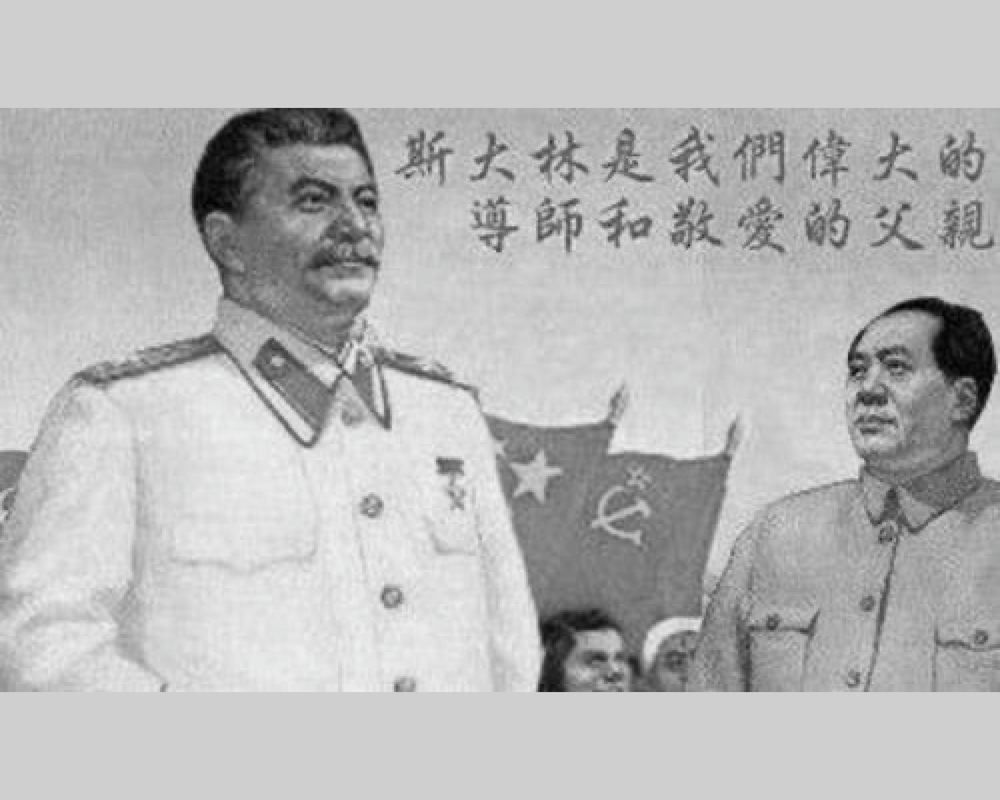
Poster titled Stalin is Our Great Teacher and Beloved Father published by the Chinese Communist Party
Therefore, by looking back at the events of twenty-six years ago in history, we gain a deeper understanding of the huge significance of Mr. Chiang Kai-shek’s purge of the party and the anti-communist stance and grasp the importance of Mr. Wu Ching-heng’s report exposing the Communist Party’s treasonous conspiracy.
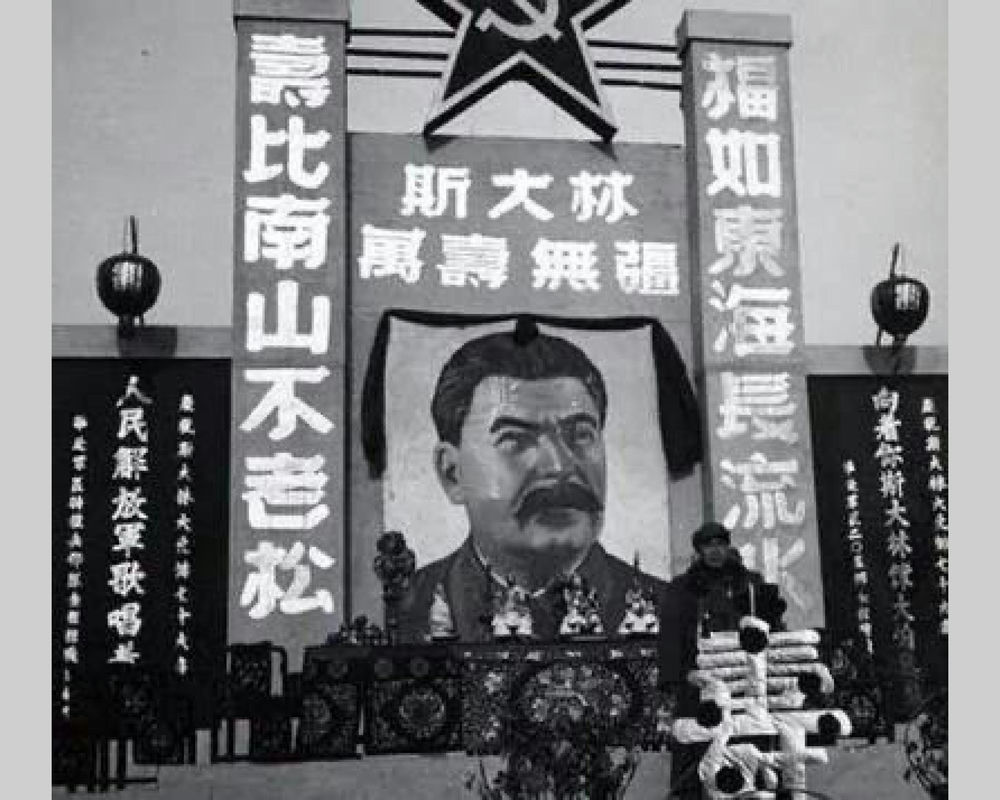
Archway constructed by the Chinese Communist Party to celebrate Stalin’s birthday
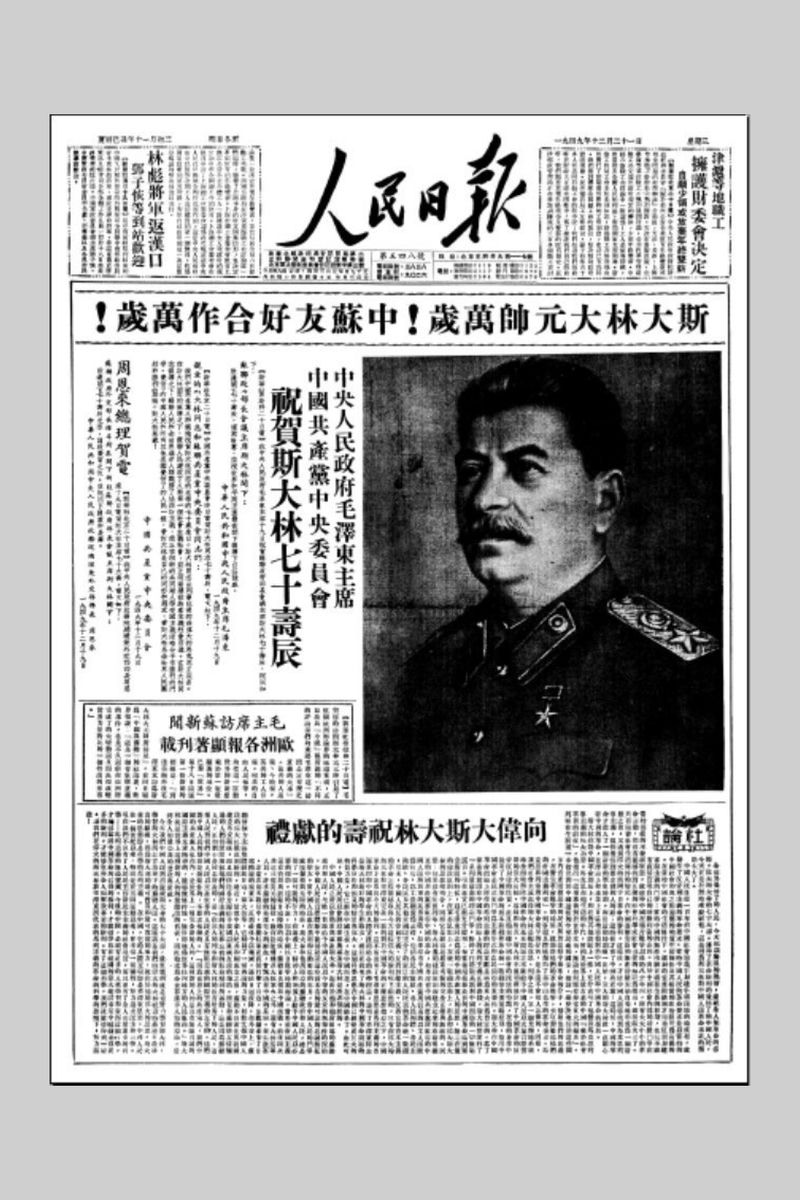
Full front page of the Communist Party newspaper People’s Daily celebrating Stalin’s birthday
At that time, I was returning to China from the United States. When my train arrived at Chicago, I learned about the tragic Nanking Incident of 24 March. When my train arrived at Seattle and just before boarding a vessel, I learned about the anti-communist purges in Canton and Shanghai. When the vessel reached Japan, I learned of the establishment of the new National Government in Nanking. I stayed in Japan for over three weeks and carefully read the newspapers from those months, which allowed me to fully understand that the advocacy for the purge of the party and the taking of anti-communist action by the group of intellectuals like Wu Ching-heng, Ts’ai Yüan-p’ei (蔡元培 1868-1940) and Chang Ching-chiang (張靜江 1877-1950) was of historical significance. Why was it significant? This is because at the time, many Chinese and foreigners could not comprehend why the Chinese revolutionary movement suddenly had a major schism and went through internal carnage. While staying at the Imperial Hotel in Tokyo, I met Professor Manley O. Hudson, a famous law professor from Harvard University who had just arrived from Shanghai. He said to me, “The recent political upheaval in China is extremely reactionary!” I asked, “How do you come to this conclusion?” He replied, “I personally heard Mr. T.V. Soong (宋子文 1894-1971) sighed and said that the principle of the National Revolution was to have the party control the military, which meant intellectuals exercising control over the military. But now it’s all over! The role of intellectuals controlling the military is completely overturned!” Mr. Hudson then asked for my opinion. I said, “During the past ten months I was in Europe and America, I do not know the details of the situation in China. But from what I see in recent political events, it is not as simple as how Mr. T.V. Soong described. General Chiang Kai-shek’s actions in purging the party and opposing communism are supported by a group of elder statesmen. Foreign friends like yourselves are not familiar with figures like Wu Ching-heng (吳敬恒) and Ts’ai Yüan-p’ei (蔡元培) but I know these individuals and greatly admire their insights and characters. This new government that has the support of these elder statesmen will survive.” During my discussions with Chinese students in Japan and conversations with Japanese journalists, I expressed similar sentiments that “Ts’ai Yüan-pei and Wu Ching-heng are not reactionaries; they are libertarians who are inclined towards anarchism. I have always respected these individuals. I am sympathetic towards a government that is supported by their moral strength.”
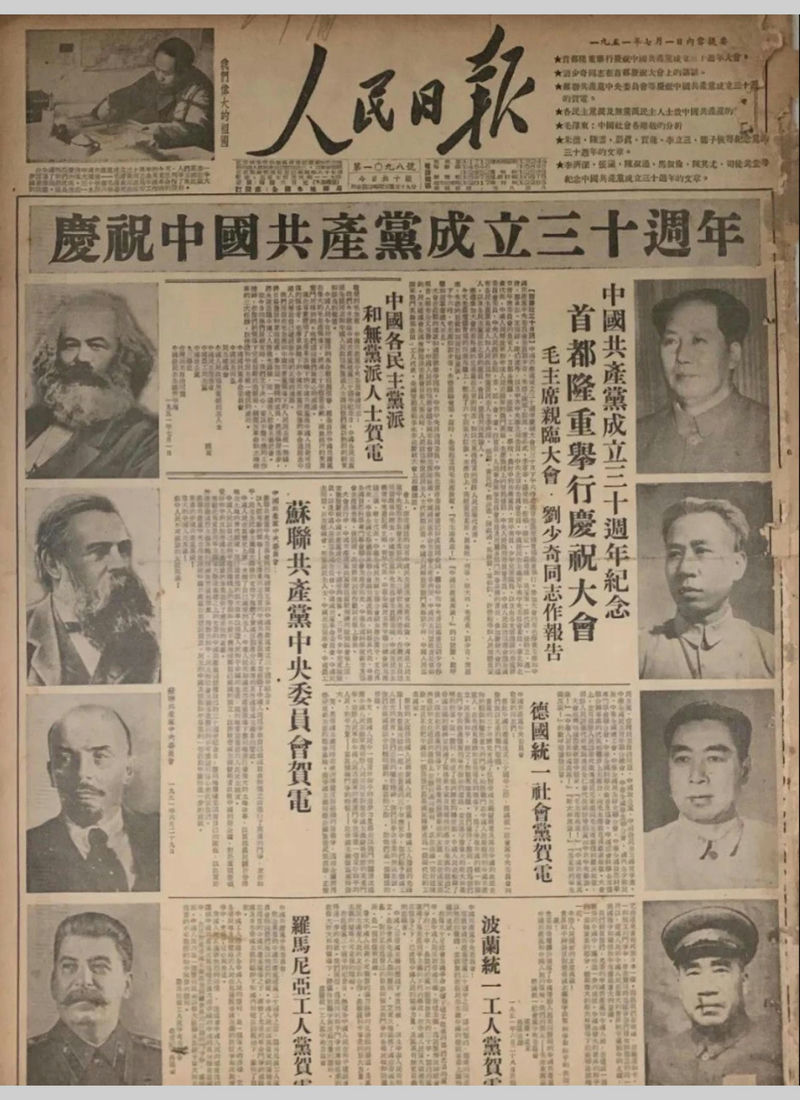
Full front page of the Communist Party newspaper People’s Daily celebrating the 30th anniversary of the founding of the Chinese Communist Party, with portraits of Karl Marx, Friedrich Engels, Vladimir Lenin and Joseph Stalin on the left
I am recalling this story to highlight the fact that twenty-six years ago, elder statesmen like Wu Ching-heng and Ts’ai Yüan-pei and others were in a perilous environment, they boldly stepped forward to charge the Communist Party of plotting the destruction of the party and selling out the nation. They advocated “taking extraordinary measures to safeguard against extraordinary catastrophes”. It was indeed a great display of moral strength. This moral strength, in the eyes of non-partisan liberals like us, undoubtedly had a profound impact.
As we remember and mourn Mr. Wu today, it must be understood that his decision to come forward and charge the Communist Party of conspiring to commit treason against the nation was based on firsthand observations and facts. It exemplified his lifelong belief in the principle of “Pursue truth, do not be a fence-sitter”.
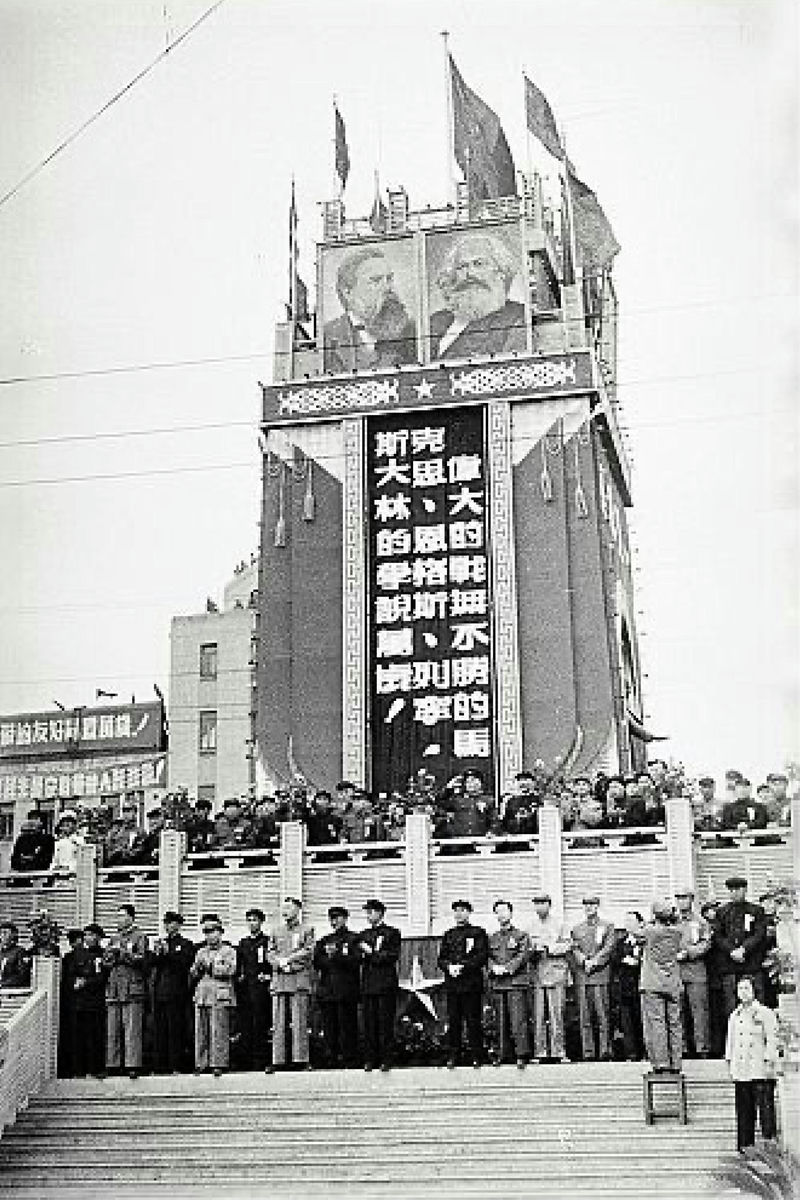
Monument constructed by the Chinese Communist Party with the words: Long Live the Profound and Ever-Victorious Ideologies of Marx, Engels, Lenin and Stalin
He was a visionary philosopher; with regard to the huge calamity of the Communist Party, indeed he was profoundly insightful. Today, in order to write this commemorative essay, I went through my old diaries. In my diary entry of 18 May, 1928, in the 17th year of the Republic of China, I recorded in detail the dinner conversation I had with Mr. Wu Ching-heng at the residence of Mr. Wang Shih-chieh (王世杰 1891-1981) in Nanking. There is a passage as follows: “Mr. Ching-heng is always worried that the Communist Party would achieve even greater success and that China inevitably cannot avoid bloodshed and turmoil. However I don’t share the same view ...” This conversation took place twenty-five years ago. From today’s perspective, I was wrong. His foresight is truly admirable.
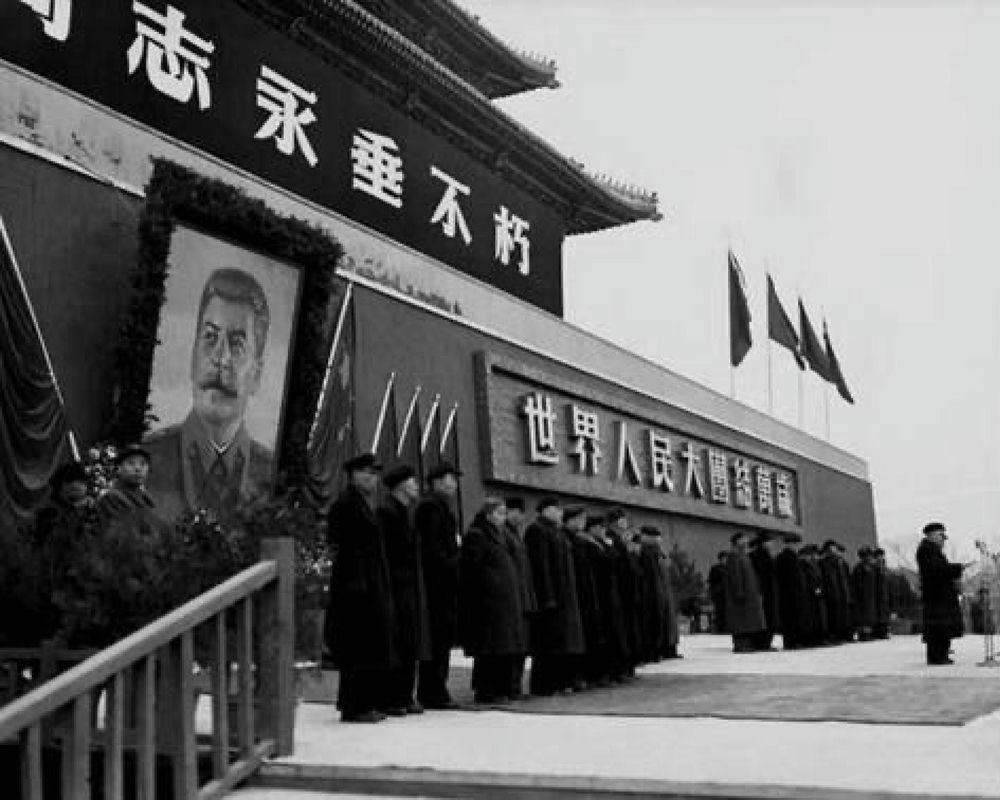
Members of the Politburo of the Chinese Communist Party attending the memorial service of Stalin in Peking
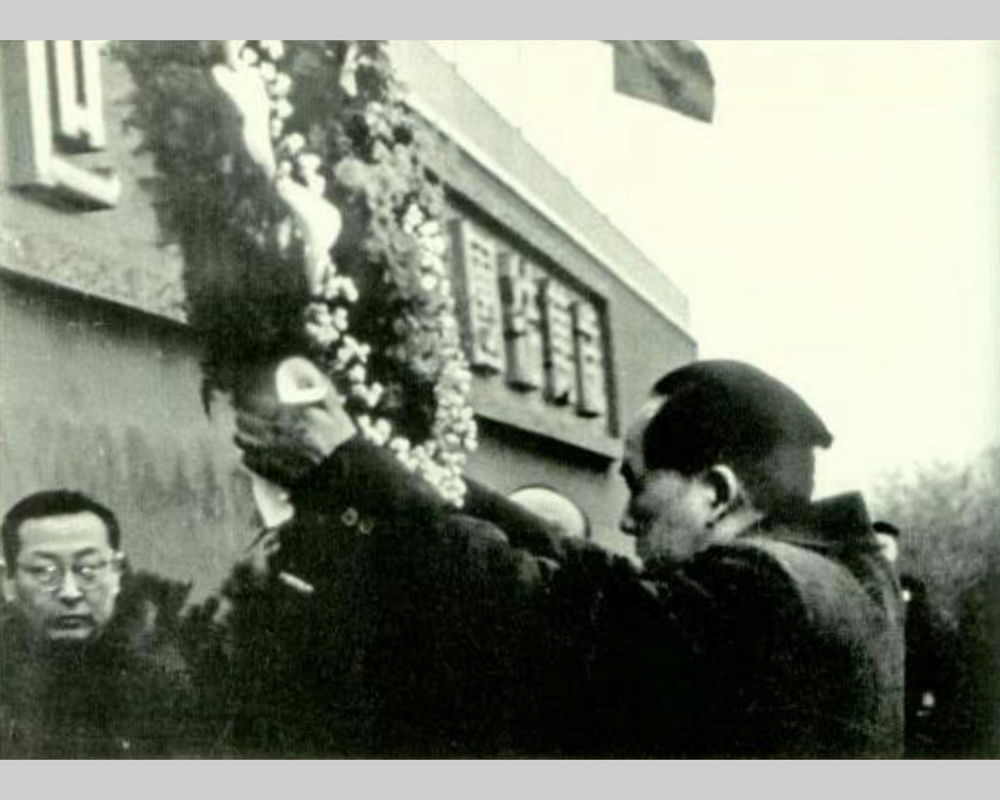
Mao Zedong holding the wreath at the memorial service of Stalin in Peking
Regarding the ideology of Mr. Wu Ching-heng, I once wrote a lengthy narrative of more than ten thousand words: Several Anti-Neo-Confucianism Thinkers in Volume 2, the 5th essay, of Hu Shi’s Collected Works (幾個反理學的思想家). (Note: In the new edition of Collected Works of Hu Shi 胡適文存 printed by Far East Book Company 遠東圖書公司, this article is in Volume 3, Book 1, pages 82 to 107). I very much hope that my friends Mr. Ch’en Po-t’ung (陳伯通), Mr. Hu Po-yüan (胡博淵) and others who are familiar with Mr. Wu’s life and achievements can take the time to write a good biography of this extraordinarily independent-minded Chinese philosopher whose brilliance illuminates people throughout his lifetime. In the Central Daily News earlier this month, I read the article National Loss of a Virtuous Elder by Mr. Yang K’ai-ling (楊愷齡), and only then learned that in January of the 38th year of the Republic (1949), when Mr. Wu Ching-heng resolved to die in Shanghai, he destroyed sixty years’ worth of carefully preserved letters and records, “after tearing them into shreds, he personally supervised the burning”. Within one week, he burned “several boxes of things”. This is truly a great loss for the nation and for humanity. I hope Mr. Yang can tell us whether, apart from those “several boxes” already burnt, are there any documents that were not destroyed and were transported to Taiwan? Have they been saved here?
There are many touching anecdotes about Mr. Wu during his lifetime, and I hope his relatives, friends, and students can record these anecdotes. This is the responsibility of those of us who love and admire Mr. Wu.
Mr. Wu’s “Philosophy of Life” is summarized as:
“In the vast universe, there is boundless potential.
May my friends not lead thoughtless lives!”
We will not forget this man who had never ever settled for a thoughtless life!
(Written by the late Ambassador Hu Shih in the evening of 24 October in the 42nd year of the Republic at his New York residence. First published in Free China Magazine, Volume 10, Issue 1).
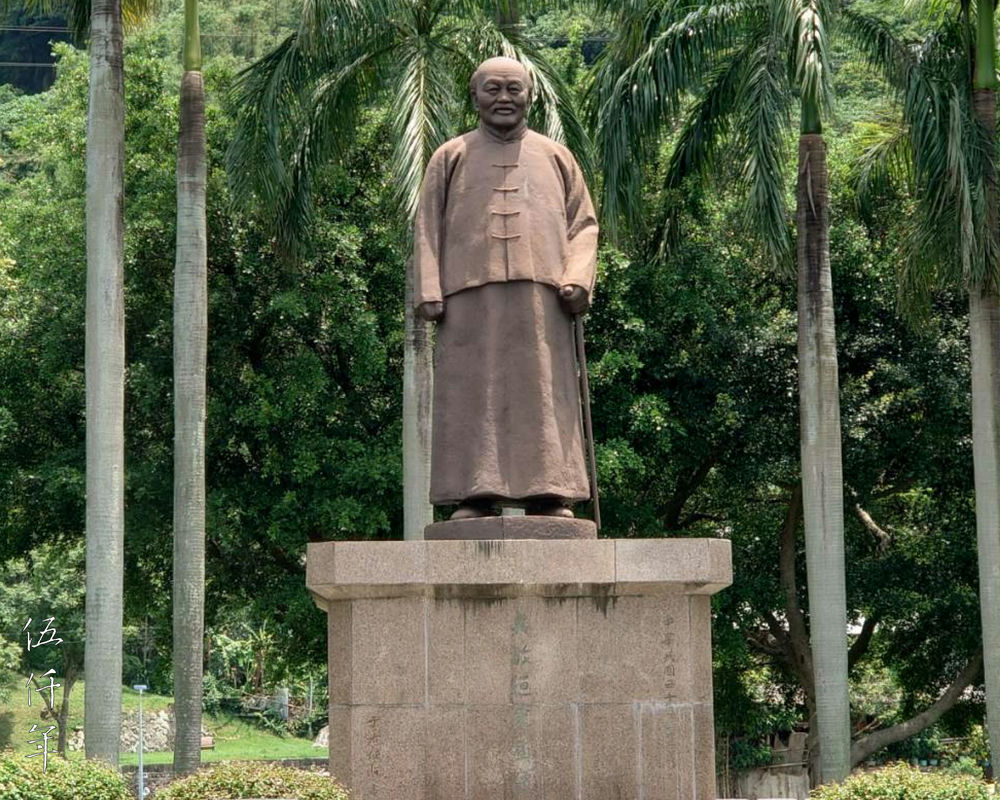
Statue of Mr. Wu Ching-heng in Zhishan Park of Taipei
Related Contents:
Personal Seal and Family Letters of the Exemplary Mentor Wu Ching-heng (吳敬恒)
